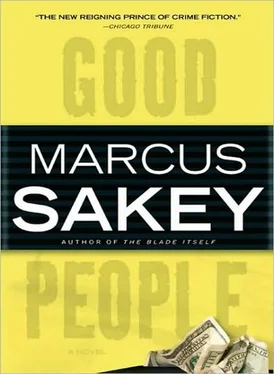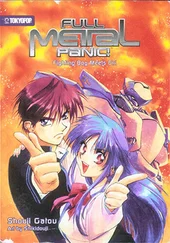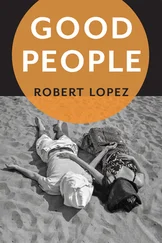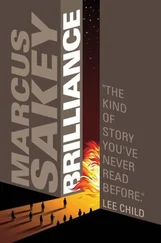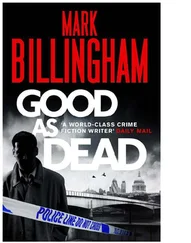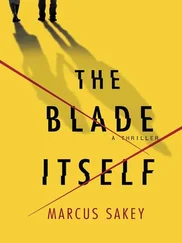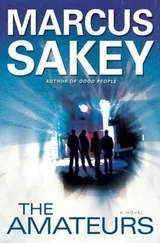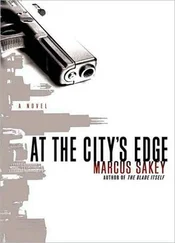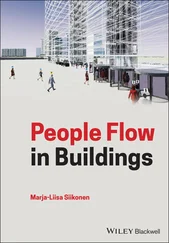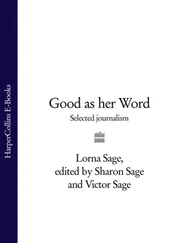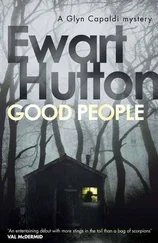He went to the bookcase and began shoving novels to the ground by the armload. Opened the cabinets below and scattered DVDs and board games. Went to the entertainment center, took hold of the TV, a big Zenith, forty inches easy, and yanked it forward. The thing hung for a moment on edge, wavering like a beast on the lip of a cliff, and then it plummeted. The picture tube exploded with a high-pitched pop, and glass crunched against the hardwood. He could feel his heart starting to go, his breath coming a little faster. It felt good.
In the bedroom he slashed the mattress in a dozen places, tore the pillows to clouds of wobbling feathers. Yanked the drawers from the dresser and upended them, then tossed them on the mauled bed, leaving the dresser to gape. He tore clothes from the rack in the closet, striped yuppie shirts and fancy sweaters. Ripped down a shoe rack, a dozen varieties of what looked like the same black heel clattering. Jerked the medicine cabinet off the bathroom wall. Ripped down the shower curtain. Used the lid of the toilet to shatter the tank, porcelain ringing loud, water pouring out to drench his pant legs, drown his shoes. A migraine had been formingbehind his eyes, but the destruction seemed to keep it at a distance.
The spare room was stacked with banker boxes, no furniture, like they’d had other plans for the room that never came together. One by one Jack tossed the lids and shook the contents out, bills and letters and tax returns flipping and fluttering like crazed birds. Yanked a bookcase off the wall. Found a box of photos and upended them, a dozen years of weddings and Christmases and quiet Sunday mornings spilling across the ruin of the den. He unzipped his pants and pissed all over them. Fuck Anna and Tom Reed. Fuck them eternal.
From the doorway he heard Marshall speak. “Unless that thing in your hand is a magic wand, I don’t think it’s going to help us.”
Jack shook himself dry, zipped up. His breath coming hard, steady and strong, even as his head throbbed. He wanted to spit in the eye of God. “Nothing in the kitchen?”
“There’s nothing anywhere, man. The money’s not here.” Marshall paused. “But you knew that, didn’t you?”
Jack didn’t answer. He stepped into the hallway, looked around. The floors of every room were covered with broken glass and piled fabric, spills of paper and upended furniture.
“Let’s go.” Marshall spoke calm, steady.
“One more thing,” Jack said.
The pillar candle in the bedroom would do. He walked back to the kitchen, where pans and broken dishes lay strewn among multigrain waffles and Tupperware and butcher packages of steak. Every kitchen in America had a junk drawer. He found where Marshall had dumped it, rubber bands and batteries and take-outmenus, and kicked through to find a pack of matches. Lit the candle and set it on the kitchen table.
“What are you doing?”
It made sense. For the Reeds, this was the way the whole thing had started. There was a nice sense of circularity. Jack gripped the edges of the big Viking range and yanked. The base squealed against the tiles, and a metal flex-hose stretched out to the wall. He hoisted himself up onto the counter, maneuvered a foot around, then stomped the point where the hose met the stove. Again and again, the coupling bending, then, one more good hit, snapping free, the sweet fart stink of gas rising fast.
“Jack-”
“Let’s go,” he said.
Marshall looked at him, then at the stove. He shook his head and started down the hall. Jack followed, closing the front door behind him. They walked down the stairs, stepped out onto the porch. Jack felt better than he had in days. Destruction had, at least temporarily, transmuted the anger and frustration and grief into an almost sexual tingle. They started down the block.
After a moment, Marshall said, “It’s easier running together.”
Jack nodded.
“Somebody to watch your back, no worries about the other guy having been caught, making a deal. I’d rather we stuck together. But you need to understand something.” Marshall’s voice formal, like he was picking his words carefully. “I’m sorry about Bobby, but you need to let it go.”
“He wasn’t your brother.”
“That’s right. He wasn’t my brother.”
“You have a point?”
“Yeah.” Marshall stopped, and Jack turned to face him. “I’m done. I’m not disrespecting you or Bobby. But I’m done here.”
“We can’t run without the money.”
“Bullshit.” Marshall shook his head. “If we knew where it was, nothing would stop me getting it. You know that. But we don’t. So I’m going. You want to come, great. If not, you’re on your own.”
Jack narrowed his eyes. He and Marshall had known each other a long time, done a lot of work together. But in the end, everybody stood alone. “Might be that’s best.”
They stared for a long moment. Then Marshall shook his head, started walking again. Jack followed.
There was a bright orange ticket under the windshield wiper of the Ford. Parking without a neighborhood sticker. This town. Everybody playing an angle, even the government. Especially them. Jack dropped the ticket on the street, then pulled himself into the cab. Marshall got in the other side.
They could run without the money. But the thought of Tom and Anna winning? He’d rather pull out what was left of his hair than let that happen.
Yeah? Rather spend the rest of your life in a SuperMax? Twenty-three hours a day in solitary?
The thought came from a quieter part of him, and came cold. It chilled the destruction high right out of him. Had he climbed so far into his own head? He’d shot a cop earlier this morning. If he got caught, that was that. Everything else they’d done, he might have gotten away with for lack of evidence and witnesses. With a good lawyer, call it ten, out in four. But nobody walked after murdering a cop.
If only he knew where Tom and Anna were, knew whether they’d given up the money. Somewhere in this city, the two of them sat safe. He punched the steering wheel, hitting it hard. An image of Bobby popped into his head, ten years old and beaming as he rode wobbling down an alley on the bike Jack had stolen for him.
“How much was in the bag?”
Marshall looked up, his gaze quick. “Maybe ten grand.”
Ten grand. Plus they had the briefcase of drugs. They’d have to unload that wholesale. Call it another ten, twenty in all. Not something to retire on. Not money that would let him buy into a bar in Arizona. Not money that was worth his brother’s life.
But it was enough to get them the hell out of here, and to lie low for a while. Plan the next move. Get back to work. He sighed, said, “Count it, would you?”
“Sure. Sure thing.” Marshall’s voice sounding relieved. He reached behind the seat, pulled the bag into his lap. Jack sat and watched. Every time Marshall dipped into the black duffel bag, he came out with a handful of hundred-dollar bills. But soon the handfuls dwindled to pairs, and finally to single bills. Finally he zipped the bag and hoisted it by the handles, turning to put it away. The image reminded Jack of something. Something he’d seen recently. What was it?
It hit. “Wait.”
“What?”
He felt a smile beginning somewhere deep. Could it be? “The bag.”
“What about it?”
“It look familiar to you?” The smile pushed upward, bubbling from inside of him, and as it did, from behind came a sudden roar and the sound of a dozen windows shattering at once. They both turned to look as flame punched out the glass in a shimmering arc, the wash of heat physical even at this distance. Photographs and loose paper rolled in front of the blast of fire, twisting and looping like they were surfing the inferno. Even as the explosion faded and reversed, sucking air back in, yellow-orange tongues began to lick up the curtains. Jack could imagine the cashmere sweaters and Egyptian-cotton towels and high-thread-count sheets smoldering and twisting. Trickles of gray began to ooze out the broken windows, darkening with every moment as the house caught. A smoke alarm shrieked senselessly.
Читать дальше
